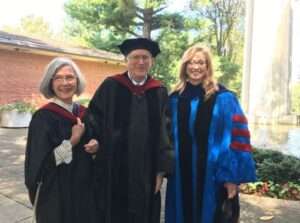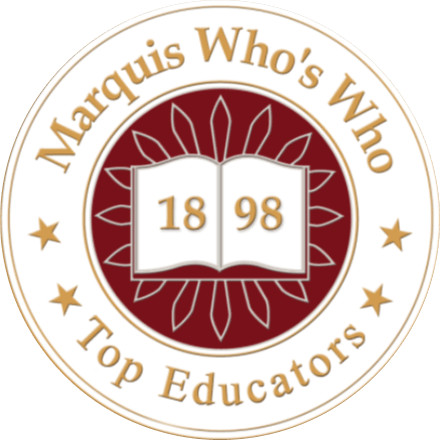
Title: Adjunct Professor of Spirituality and Church History
Company: Wesley Theological Seminary
Location: Washington, D.C., United States
Dr. Arthur “Art” Dicken Thomas Jr., adjunct professor of spirituality and church history at Wesley Theological Seminary, has been recognized by Marquis Who’s Who Top Educators for dedication, achievements, and leadership in religious education.
With nearly three decades of experience to his credit, Dr. Thomas has established a successful career specializing in church history, spirituality, spiritual theology, and art and spirituality. He currently serves as an adjunct professor of spirituality and church history at Wesley Theological Seminary, a role he has held since 1994. Additionally, he was a professor of Christian spirituality with the Ecumenical Institute at St. Mary’s Seminary & University from 1996 to 2017.
In 1990, Dr. Thomas caught the vision of Professor Catherine A. Kapikian, founding director of the Henry Luce III Center for the Art and Religion at Wesley Seminary, as he encountered her curriculum for incorporating the arts into theological education through courses on visual art, chancel drama, liturgical dance, church music, literature, and spirituality. To show the influence of spiritual traditions and spiritual writers upon the creation of visual art, she invited Dr. Thomas in 1995 to team teach with her a new Wesley Seminary course titled “Art and Spirituality: The Influence of Schools of Spirituality upon Art History,” which would contribute to the Center’s educational goals. They continued to teach this until her retirement in 2007. Out of this collaborative effort, Professor Kapikian and Dr. Thomas also led eight art and spirituality tours to different European countries, which offered course credit to master’s and doctoral level students of Wesley and St. Mary’s seminaries. Because art history is one of his passions, Dr. Thomas continues to incorporate art history into his courses.
Dr. Thomas is the author of the recently published multi-volume “Outpourings of the Spirit: St. Giles Presbyterian Church, Richmond, Virginia” for Exousia Press in 2025, which includes “Volume 1: Evangelical Revivals and Social Reform, 1937-1971;” “Volume 2: Charismatic Renewal, 1971-1990:” “American Presbyterian Renewal Leaders, St. Giles Pentecost, and the YWAM Revival;” and “Volume 3: Third Wave Revival and Empowered Evangelicals, 1990-2025.” This series draws upon his PhD concentration in American religious history and his years of teaching in that field at Wesley Seminary. Most local church histories capture the interest of their own members yet have limited appeal elsewhere; however, this history is written for a larger audience: it is a case study focused on biographies of the six pastors showing how during seasons of revival they and the congregation were influenced by worldwide movements such as Evangelicalism, Moral Re-Armament, Neo-Orthodoxy, Neo-Evangelicalism, Charismatic Renewal, Healing Ministry, Civil Rights, Racial Healing, Third Wave Renewal, and Global Mission.
After completing these three volumes, Dr. Thomas will revise and update his previously published book, “The Second Great Awakening in Virginia and Slavery Reform,” which was originally published by UMI in 1982, in which he will demonstrate how antebellum converts of these revivals were moved by religious convictions to take either a radical or moderate stance toward the abolition of the enslaved. By analyzing the spirituality of these Evangelicals, he will show motivations for their slavery-reforming ventures. He has authored books and articles on Episcopal, Presbyterian, and Methodist history in America, with an emphasis on revivals, slavery reform, piety, spiritual direction, and Evangelicalism.
Dr. Thomas’ other published works include “Early Churches of Culpeper County, Virginia: Colonial and Antebellum Congregations” for the Culpeper Historical Society in 1987, “The Rex Family of Pennsylvania, Virginia, and Maryland ….And the Allied Mack, Gorgas, Dewess, and Rittenhouse Families,” “The Ancestors of the Jefferson, Smith, and Bobbitt Families of Virginia and North Carolina,” and “Willis United Methodist Church, 1803-2023: A Pictorial History of Its 220 Years in Glendale, Henrico County, Virginia.” His most recent articles include “Edward Dromgoole, Sr.: A Virginia Methodist’s Attempts to Follow John Wesley’s Antislavery Ethic” for Virginia United Methodist Heritage 48 in 2022 and “Rufus Womble OSL Chapter: Sixty-eight Years of Healing Ministry in Richmond, Virginia” for Sharing 93 in 2025.
Dr. Thomas acknowledges his professors’ profound impact upon his intellectual and spiritual development. He has laid a solid educational foundation with a Bachelor of Arts in history and religion from the College of William and Mary in 1972 (where Professors David L. Holmes and James C. Livingston influenced him to pursue teaching the history of Christianity), a Master of Divinity, magna cum laude, from Gordon-Conwell Theological Seminary in 1975 (where Dr. Richard Lovelace inspired him to pursue studies in revival history and spirituality), a Master of Theology in church history from Union Presbyterian Seminary in 1976, a Master of Arts, summa cum laude, in 1994 in spirituality and Christian education from Wesley Theological Seminary (where Dr. Douglas M. Strong guided his studies in Evangelicalism and social reform), and a Doctor of Philosophy, with honors, in church history in 1981 from Union Presbyterian Seminary (where Dr. J. A. Ross Mackenzie influenced him to study the history of Christian spirituality and Dr. James H. Smylie, his dissertation advisor, taught him the connection between revivals and social reform). In light of his undertakings, he was awarded the Distinguished Faculty Lecturer Award at the Ecumenical Institute, St. Mary’s Seminary & University, in 2010. He attributes his success as a clergyman and educator to a deep sense of calling from God to fulfill his destiny. This calling, he believes, is strongly manifested in his pastoral ministry and teaching roles, fueled by his spiritual gifts and profound passion for spiritual formation, church history, the arts, and historic restoration.
Dr. Thomas’s career, driven by his passion for spirituality, revival, and social reform, led him to pursue ordination and higher education with the goal of both seminary teaching and pastoral ministry. He served as pastor of two Presbyterian Church USA congregations in Culpeper County and Salem, Virginia before feeling drawn to academia, prompting further studies in spirituality in Washington, D.C. at Wesley Theological Seminary (where he was profoundly influenced by Dr. Robin Maas, a Catholic scholar and Professor of Christian education and spiritual formation, who taught him spiritual theology and introduced him to the riches of the Catholic mystics). During this time, he also studied spiritual direction and the history of spirituality at Washington Theological Union (under Elizabeth Dreyer); at Regent College, Vancouver, Canada (under important authors on spirituality, such as James M. Houston, J. I. Packer, and Eugene Peterson); and at the Shalem Institute for Spiritual Formation (under Tilden Edwards and Gerald G. May). He studied “Christian Art from the Catacombs to the 20th Century” under Professor Kapikian and other art historians. This path led to teaching roles at Wesley Theological Seminary and at the Ecumenical Institute of Theology, where he became professor of spirituality at St. Mary’s, the oldest Catholic seminary in the United States. Upon the retirement of Dr. Maas, he began teaching her courses on Foundations of Christian Spirituality and Spiritual Traditions at both Wesley and the Ecumenical Institute as well as other courses, such as “the History of Christian Spirituality,” “American Revivals, Pentecostalism, and Reform,” “Spiritual Gifts for Congregational Ministry,” “Art and Spirituality”, “Spiritual Theology”, “Spiritual Disciplines”, and the “The Spirituality of Prayer”. For three years he taught short term intensive courses on Spirituality for Doctor of Ministry students at Fuller Theological Seminary and Wesley Seminary.
Dr. Thomas advises those on a similar path to begin fulfilling their destiny by discerning their calling, passions, and gifts through prayer and reflection with the help of a spiritual director and emphasizes the importance of recognizing one’s role in making a positive impact on the world. He also encourages aspiring individuals to adopt an altruistic mindset focused on contributing to others, God, and the community.
While engaging in academic teaching at both seminaries each semester, Dr. Thomas transferred his ordination from the Presbyterian Church USA, which had taken place on July 19, 1979, to the Baltimore-Washington Conference of the United Methodist Church in 1996 where he also served pastoral appointments as an elder in Baltimore County, Taneytown, Bethesda, and Westminster, Maryland and Henrico, Virginia in addition to his regular seminary teaching. He found that his combined service in the seminary and the parish made his teaching more practical for seminary students as he added insights from his pastoral experience and made his sermons more stimulating for his parishioners as he drew from his seminary class insights.

For more information, please visit:
Contact Rev. Thomas:
